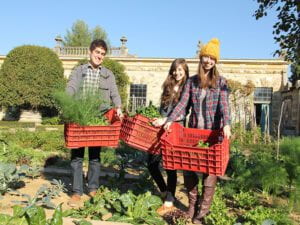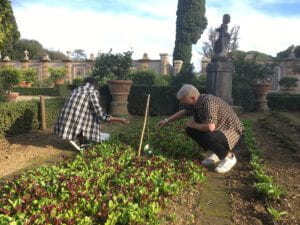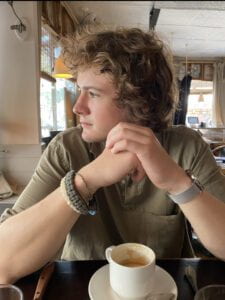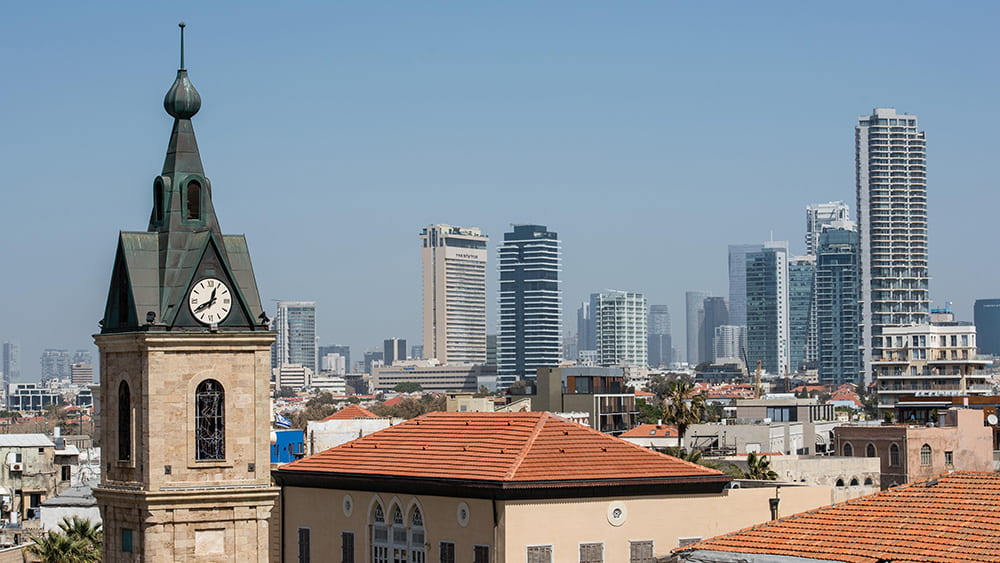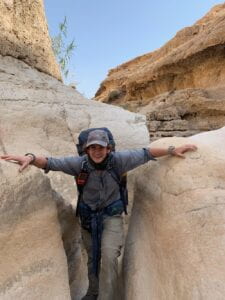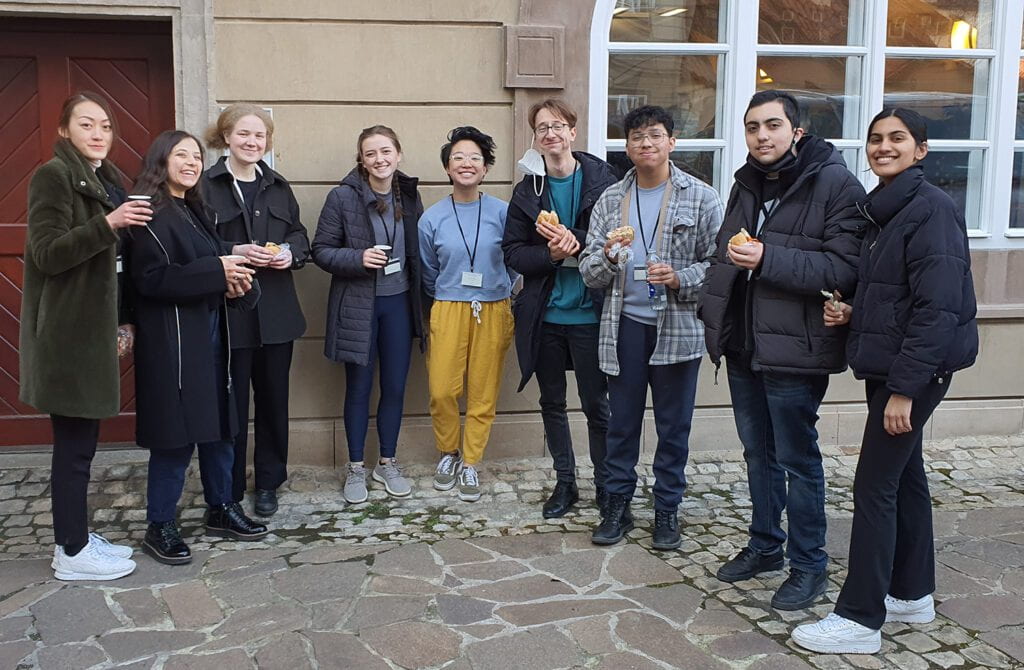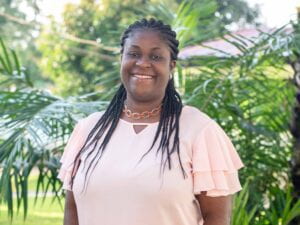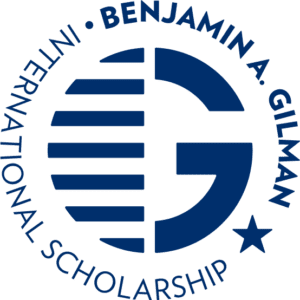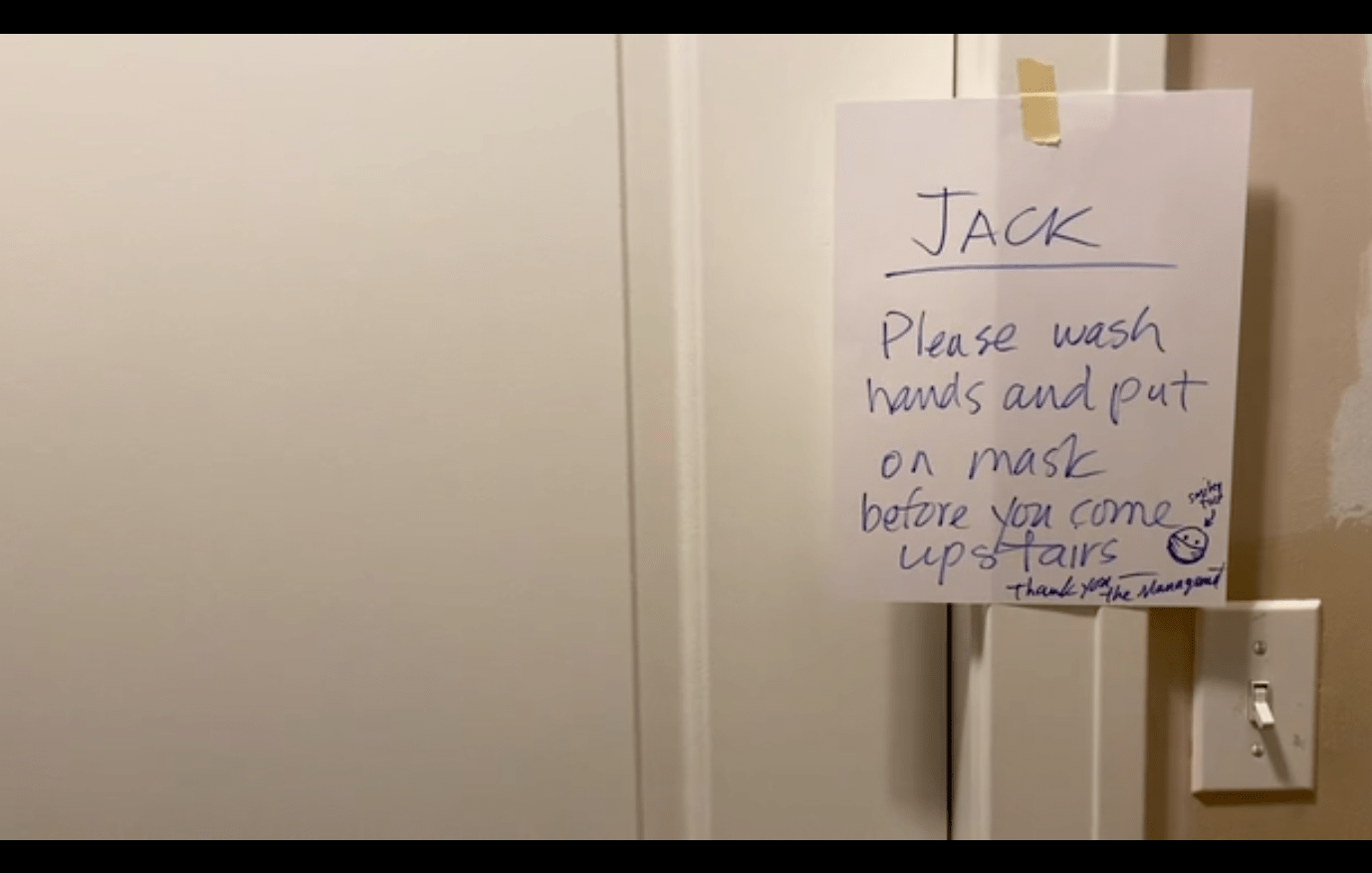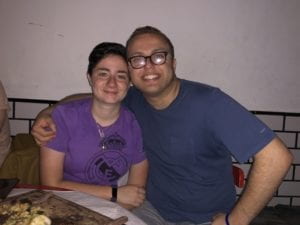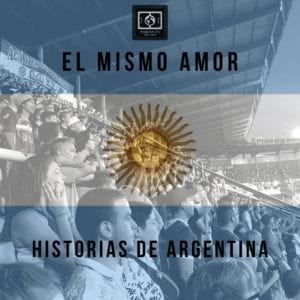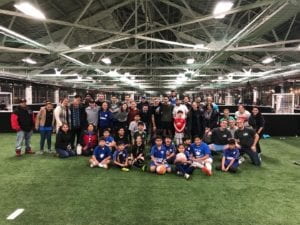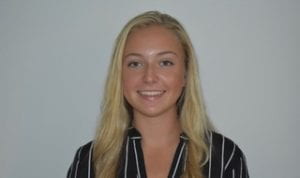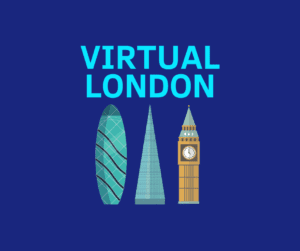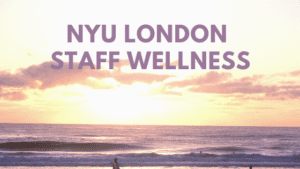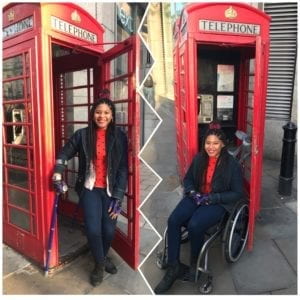 When Johileny Meran went to study at NYU London in the fall of 2018, she knew the experience would change her life. But she did not anticipate that her experiences there would directly lead to a meaningful career opportunity. Meran, a global public health major who graduated in 2019, is now working with Mobility International USA (MIUSA) to support students with disabilities who are considering studying abroad or other forms of international exchange. Meran served as NYU London’s Global Equity Fellow (GEF) while there and bolstered NYU’s commitment to addressing diversity, equity, and inclusion abroad by creating an access guide for NYU London.
When Johileny Meran went to study at NYU London in the fall of 2018, she knew the experience would change her life. But she did not anticipate that her experiences there would directly lead to a meaningful career opportunity. Meran, a global public health major who graduated in 2019, is now working with Mobility International USA (MIUSA) to support students with disabilities who are considering studying abroad or other forms of international exchange. Meran served as NYU London’s Global Equity Fellow (GEF) while there and bolstered NYU’s commitment to addressing diversity, equity, and inclusion abroad by creating an access guide for NYU London.
According to Meran, “Student life experiences on campus can differ based on disability. In the fall of 2018, as a GEF, I created a guide to London’s accessibility culture in an effort to help future students understand what to expect from a student perspective. It is all-encompassing in terms of including a diverse group of resources. I was committed to being a resource and helping improve diversity resources at NYU. Through my role, I learned that my experience informs my work rather than limits the scope to which I can do it.”
Meran not only made a lasting contribution to NYU London during her time at NYU by creating the NYU London Access Guide, but also to issues of disability awareness and accessibility abroad more generally. We had the chance to catch up with Meran and ask about her experiences at NYU London and her current work.
- Can you tell me about your NYU career? How did you decide on your study plans?
One of the things that had me most excited about NYU was the fact that it was a global network and I wanted to know about the world and I thought being at NYU would offer a great start. The Arthur O. Eve Higher Education Opportunity Program also provided me with a support system from the start.
I entered NYU undecided about my major. At the time, I was still holding onto a life-long dream of becoming a doctor. During my first and second years, I realized that there was so much more that I could learn. I am a first generation college student, and college really opened doors for me in terms of learning what else was possible in the world. When I took one of my first classes in global public health, I immediately fell in love with the entire concept. I also thought it was important to think about the various influences on public health globally. Additionally, I noticed that there was not a lot of conversation around people with disabilities in public health and believed I could make a contribution there.I got hooked on global public health, and I just went for it.
- Why did you decide to study abroad and why NYU London?
I knew I wanted to study abroad from my first year. I came to the United States from the Dominican Republic at a young age and I wanted to know more about what the world looked like and I thought studying abroad would be a great way to do that. I also knew that an NYU study abroad experience would provide a great environment to learn via studying rather than just traveling. I was also interested in exploring disability rights in different places and access in general.
I studied abroad very late in my NYU career compared to my peers. I traveled as a senior, rather than as a junior or sophomore. The reason for that was that, having come from a different country myself, I knew that access and disability rights are very different from one country to another. I did a lot of research because I wanted to know that not only would I be in a new place, but that I could do more than just go from my dorm to the academic center. NYU London was a great choice partly because of the accessibility of London as a city and partly because I was curious to explore the differences between British and American English. I already speak two languages so learning a new language was not a priority for me. But I knew London offered a chance to learn more about language in a different context.
- You were the NYU London Global Equity Fellow in Fall 2018. Can you share what inspired you to participate in the GEF program? What were your priorities in that role?
I applied to be a Global Equity Fellow because of my experience as a student at NYU in New York. In a sense, I stumbled into disability advocacy on campus. I personally found that the best way to find community was to participate in NYU clubs and student life. Without a community, it can sometimes seem like a very big and vast place. I immediately started participating in and going to events organized by NYU clubs that aligned with my identity – the Latino Student Union LUCHA (Latinos Club), the Black Student Union, the First Generation Club. In those clubs and in those meetings, there was something missing for me because disability was never part of the conversation. So I decided to start bringing disability to the conversation and got a positive response from my peers. They wanted to know more and asked how they could help me tofounda disability community.
By the time I was studying away, I was already president of the NYU Disability Student Union. I was also one of the chairs of an accessibility committee, along with faculty and administrators at NYU. I had established a great relationship with the Moses Center – it was an important source of support for me. The GEF program was a great opportunity to continue that work while in London. It was not just about disability, but diversity and equity and inclusion in general. I was inspired to apply to be a GEF so that I could further explore these issues and discover what more I could bring to the table.
- One of your many contributions as a GEF was the NYU Access Culture Guide. Can you talk about working on that and what making that lasting contribution to NYU meant to you?
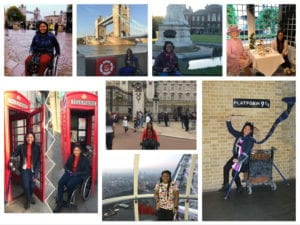 In the beginning, I was very hesitant to do a disability-focused project. I considered taking a more general approach to diversity issues and not focus on disability. I had a few conversations with the GEF Student Advisor in NY about why I was holding back about bringing disability into the work and it dawned on me that this was something I could bring to the table. One of the nice things about arriving at NYU London was that there were so many pamphlets to orient students to the city. I realized that I could bring an accessibility lens to the information that is available to incoming students. One of the things that I really enjoyed about the project was that not only were the staff excited, but the students as well. When I shared that I was looking to put information together about what access was like in London, there were so many contributions. I also reached out to Emely Recinos, another student with a disability who was studying in NYU Buenos Aires at the time, to get her perspective about what access issues she wished she knew about before going to Argentina. The guide is not meant to be definitive; students are welcome to change it in later years.
In the beginning, I was very hesitant to do a disability-focused project. I considered taking a more general approach to diversity issues and not focus on disability. I had a few conversations with the GEF Student Advisor in NY about why I was holding back about bringing disability into the work and it dawned on me that this was something I could bring to the table. One of the nice things about arriving at NYU London was that there were so many pamphlets to orient students to the city. I realized that I could bring an accessibility lens to the information that is available to incoming students. One of the things that I really enjoyed about the project was that not only were the staff excited, but the students as well. When I shared that I was looking to put information together about what access was like in London, there were so many contributions. I also reached out to Emely Recinos, another student with a disability who was studying in NYU Buenos Aires at the time, to get her perspective about what access issues she wished she knew about before going to Argentina. The guide is not meant to be definitive; students are welcome to change it in later years.
I appreciated being able to give future NYU students something that I didn’t have. I relied on information from the Moses Center and the NYU London staff before I traveled, but there was still more I wish I knew in advance. So it felt good to know that I was giving future students more information to go in with. Much of the information in the guide elaborates on topics, like transportation, that were already covered in the existing student guide. I put it all together because I wanted more people to realize that the accessibility information for disability is so similar to the information that students already get. It actually does not need to be separate, but just included as an extra layer to the information already provided. After I finished the project, I felt really accomplished in the sense that another student interested in studying abroad would have this great information.
- I understand that you are now working with Mobility International USA as a Program Coordinator for the National Clearinghouse on Disability and Exchange (NCDE). As I understand it, NCDE is a project focused on increasing the participation of people with disabilities in all types of travel with a purpose. What is your focus?
The National Clearinghouse on Disability and Exchange (NCDE) is a project under the organization I work for, MIUSA, and it is sponsored by the State Department’s Bureau of Educational and Cultural Affairs. When I learned about this project, I was just so excited – beyond excited – because there is so much information available to anyone through the website. NCDE provides detailed information about preparing to go abroad, including creative ways to get around, and information about attitudes on disability that you may encounter during your exchange.
One of my favorite aspects of the project is also the personal stories. We collect and share personal stories from students with disabilities who have studied abroad in a range of places around the world. I love reading about their experiences. Sometimes you have moments of thinking that access is so hard in a particular country, why would someone go? But in reality it is a lot about the challenge you want to put on yourself as a student. I realized that the information shared via NCDE was a lot like the information I included in the access culture guide.
In my role, I focus on a variety of projects as part of the NCDE team of four, including the Inquiry and Referral Service. Anyone with a disability or any international exchange professional can submit a question and we do research to answer it. After receiving an inquiry, I immediately consider what the best resources are that I can offer this person – tip sheets, personal stories, etc – and then I also consider whether there are country-specific resources that I can offer. We provide meaningful support for both professionals trying to support a student with a disability or students with disability looking for information.
I also conduct interviews with students about their experiences and compile resources for the NCDE newsletter, Access to Exchange. It includes personal stories about experiences abroad, stories about disability access, and funding opportunities, among other things.
Finally, I regularly speak on panels or in other contexts to provide information about the services and opportunities we offer. The intent of this outreach is to encourage more students with disabilities to study abroad and participate in international exchange in general. Similarly, we also offer information and support to international students looking to come to the United States. We hope to see a more inclusive approach to exchange with disabled students participating along with their non-disabled peers.
- How did your time at NYU London inform your decision to work with Mobility International on NCDE?
I met someone from Mobility International right after I returned from London. During the spring semester of my senior year, I was recruited by a summer camp I used to attend to come work for them for the summer. I went for my training during my last semester at NYU and it happened to be family day at the camp and one of the organizations presenting was Mobility International. I introduced myself and shared that I had just come back from London and that I wanted to learn more about their work.
After finishing my summer job, I was invited to by Mobility International USA to present with them at the 2019 Council on International Educational Exchange Conference. Actually, I later repurposed that presentation in my first blog post for Mobility International, 4 Takeaways from my Study Abroad Experience for Exchange Professionals.
While I was still looking for work, I learned that a position had opened up with MIUSA. I was in awe of the work that they have done and the NCDE project, I thought it could be a great place to start my career. I immediately saw so many connections between what I had done at NYU London and what I could do and learn at Mobility International that I just knew it was right.
- What would you say to other students with disabilities, whether at NYU or elsewhere, who might be hesitant about studying abroad?
I think it is important for students with disabilities to participate in international exchanges. Doing so is a life-changing experience. To see a different part of the world and learn from a different culture, offers so much to you personally and to your career. Even though there may be challenges, it is a great opportunity to learn.
As a student with a disability, you are not just learning through the experience yourself, but you are also allowing others to learn from you through your experience – peers, future students, educators.
There is a great article on our website, 20 Truths that Every Exchange Participant Should Know, that addresses common concerns and highlights the benefits of study abroad.
- What would you say to administrators or coordinators of international exchange programs, whether at NYU or elsewhere, about how to encourage and ensure access for all students?
I think it is important to note that at Mobility International we have a culture and a thought process of “challenge by choice.” This is the idea that you go to a place and you know that you will be challenged there, but you know that it is a challenge you can take on. Individuals in student advising positions may have preconceived notions about accessibility issues in particular countries. MI believes that students should be prepared to make informed decisions about study abroad opportunities by understanding the realities of accessibility and knowing how they might navigate challenges while abroad. You might think that a country is too inaccessible for a student but the only person to really decide that is the student. Your job is offering and support so that they know what access challenges they might be facing and whether they are willing to navigate those challenges.
It is important to be intentional about encouraging students with disabilities. If, for example, you are recruiting students to participate in a short-term exchange program, consider including language such as“students with disabilities are encouraged to apply.” Not including disability or access information in recruitment materials creates an additional barrier for students.
- Is there anything else you would like to share or add?
My time as a GEF really solidified the benefit of student engagement. I would encourage students with disabilities to take on student leadership roles to inform educators and professionals about the information students need. Disability and accessibility are part of diversity. I mean this not just in terms of reasonable accommodations, but in terms of what student life is like.
